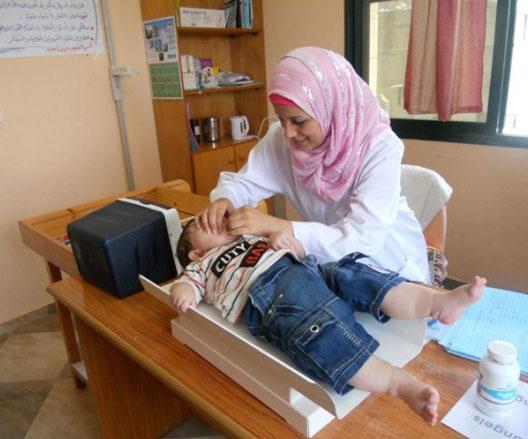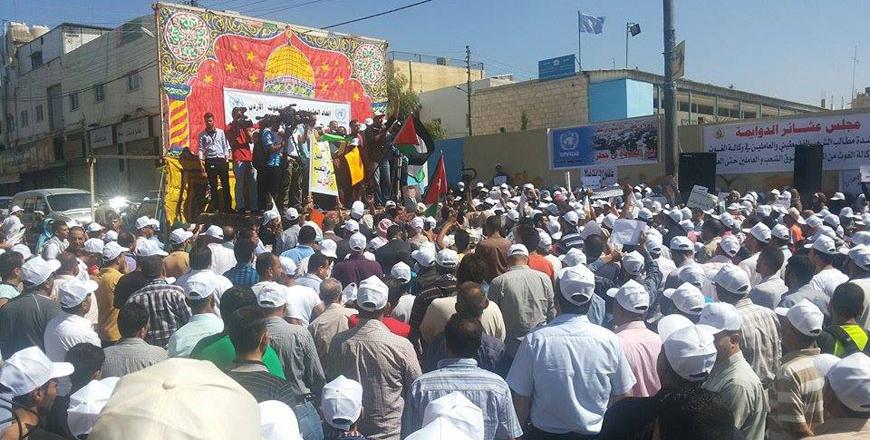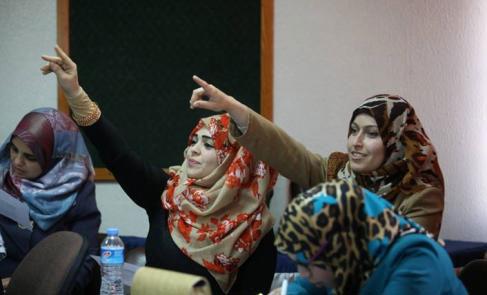You are here
Jordan urges world to salvage UNRWA, warns of consequences
By Laila Azzeh - Jul 22,2015 - Last updated at Jul 22,2015

UNRWA officials say they can sustain health services for the rest of the year amid a chronic financial crisis (Photo courtesy of UNRWA)
AMMAN – Jordan on Wednesday said it totally rejects any “shirking” of responsibilities towards UNRWA, the only UN agency that is dedicated to serve a specific national community.
With the relief organisation reaching a chronic financial crisis that might jeopardise its role as a safety network for some 5 million Palestinian refugees, the government reasserted its commitment to continue mobilising the international community to ensure the sustainability of UNRWA services.
Failure to meet the needs of the Palestinian refugees “would only amplify their suffering”, said Minister of State for Media Affairs and Communications Mohammad Momani, who is also government spokesperson.
“The international community should bear its responsibility towards the difficult humanitarian situation the refugees are enduring,” he told The Jordan Times on Wednesday.
Meanwhile, UNRWA teachers are “petrified” over their fate and that of students if no major solution is worked out to the agency’s financial crisis.
According to informed sources, who preferred anonymity, the new scholastic year at UNRWA-run schools might be delayed and so will the disbursement of their salaries.
“We are following up closely on the developments regarding the financial crisis file. In light of the difficulties and the reluctance of donor countries to help, UNRWA will not be able to maintain its services and pay our salaries,” a teacher at the agency told The Jordan Times on Wednesday.
Around 5,000 UNRWA educators out of the 22,000 employed in the agency’s five operation areas are in Jordan, the agency’s figures show. In light of this fact, the stumbling financial situation would render hundreds of teachers jobless, another teacher said, also speaking on condition of anonymity.
In earlier remarks, an UNRWA official noted that the “financial situation of the agency has reached a high level of difficulty with the commencement of July” and that efforts to bridge the budget gap, estimated at $101 million “has not boded well”.
In a recent interview, UNRWA Spokesperson Sami Mshasha did not deny the possibility of taking painful measures that might impact the coming scholastic year, but noted that closing down schools is a matter the agency will “not entertain now”.
A number of UNRWA teachers told The Jordan Times that a series of measures will be taken to protest against the agency’s situation and anticipated steps to cut services.
“We will hold sit-ins outside UNRWA headquarters and outside embassies of donor countries. The agency is blaming the donors on the situation it has reached, but we cannot be silent about the fate of the refugees and students,” one of the teachers said.
In a bid to mitigate the impact of the crisis, the agency took a series of austerity measures, including eliminating general expenditures — general expenses that do not affect services — and terminating the contracts of a group of international consultants and those working short term.
“These measures did not help much,” said Mshasha.
The main reason that aggravated the financial difficulties of UNRWA is the “inability” of some donors, who have been loyal to the agency since 1950, to “keep up pace with the number of refugees and the growing number of whom who are falling under the poverty line”.
The other reason is related to the instability of regions that host Palestinian refugees, such as Syria and Gaza, which made the agency direct its spending towards emergencies.
“And there is only a limited time span to address this. We will have to take some tough decisions in the upcoming stage,” said the spokesperson.
Nearly 80 per cent of UNRWA’s funds are directed to its 700 schools in the agency’s five fields of operations, where half-a-million students receive education.
The good news, according to Mshasha, is that UNRWA has enough funds to keep up the health and sanitation services till the end of the year.
In the recent meeting of the advisory commission, which was held in Amman, the relief agency highlighted that it is facing the most profound crisis since the original crisis in 1948, prompting host countries to address concerns over the fate of the refugees, many of whom are about to become part of an “imperilled” community in conflict zones.
The day the meeting was held some 30,000 UNRWA staff, including 7,000 in Jordan, observed a one-hour work stoppage in protest of the agency’s planned austerity measures, despite confirmations by the commissioner general, Pierre Krahenbuhl, at that time that the “costs will be cut around services to sustain them”.
Today, nearly one-third of the 5 million registered Palestine refugees, about 1.5 million individuals, live in 58 recognised refugee camps in the region.
Related Articles
AMMAN — Deemed as the only UN agency that is dedicated to serve a specific national community, UNRWA is now facing a chronic financial crisi
AMMAN — A state of anticipation is sweeping Jordan over the fate of 120,000 UNRWA students as the ultimatum given by the agency to donors be
AMMAN — Jordan on Sunday stressed that the United Nations should continue to offer services to Palestinian refugees as long as their plight













